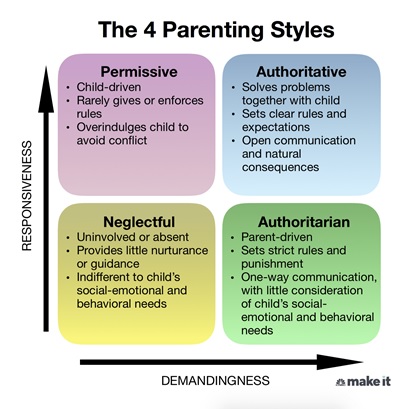Parenting Styles – Which One is Best?
4 min read
Date Published: 08/02/2022
Last Updated: 08/02/2022
National Fatherhood Initiative Blog / Latest Articles
4 min read

We came across this article on parenting styles that is valuable for anyone working with fathers and families. The content can be integrated into one-on-one meetings, case management plans, and group-based programs (e.g. National Fatherhood Initiative®’s 24/7 Dad®).
This article is written by Rod Lampard and was originally published February 11, 2022 at The Daily Dad and Dads4kids. It is republished here with permission.
An examination of various parenting styles and reflection on our own modes of parenting, can be very beneficial in honing our parenting skills for the sake of our children as they grow and mature under our guidance and discipline.
Two of the best parenting styles are ‘democratic’ and ‘authoritative’.
The bare-bones definition of the democratic parenting style is,
‘Allowing a fairness and respect to develop between child and parent.
It involves treating children as equals.’
Whereas authoritative parenting is a style:
‘Where parents set policies and explain the reason behind the rules to children and seek their opinion.’
The two are different, yet strikingly similar.
Clinical psychologist Dr Shreshtha Dhar explains,
‘Authoritative parenting is also called democratic parenting because the families practise democracy, where children have a say in their affairs.’
While my wife and I favour the authoritative style over democratic, we try to live out a balance of both.
Too much of one will undermine the benefits of the other.
Adopting the best in these two styles brings the tools necessary to flexibly live out our love for our kids loudly, with respect to our faith, and how it informs our parental duty of care.
For example, we ditch the over-demanding, iron-fisted qualities of the authoritative, while bringing in the emphasis the democratic style places on good communication, and choice.
Reversed, we ditch the permissive “kids do whatever the hell they want”, and instead we choose to govern well by way of mutually beneficial, rules and expectations.
Pros and Cons
Democratic and authoritative parenting styles have their own strengths and weaknesses.
Their greatest strength is their emphasis on individual responsibility.
Their greatest weakness is excess.
For instance, by inference, child psychologist Dr Zeltser places the democratic style into the permissive category. She defines it as:
“Kids deciding for themselves, rather than being directed.”
Democratic parenting can slide into neglectful parenting.
Similarly, authoritative can slide into authoritarian parenting.
Zeltser argues the difference between authoritative and authoritarian is the latter’s
‘Strict rules, one-way communication, a “because I said so” reasoning, and little consideration for a child’s feelings, social-emotional and behavioural needs.’
Zeltser acknowledges only four parenting styles.

Whereas child psychiatrist Hugh Misseldine insists on there being eleven — the majority of which are dysfunctional, with a few being downright criminal.
Loving Guidance
Although Misseldine’s conclusions favour democratic parenting, they are better described as Authoritative Democratic Parenting.
In essence, Misseldine merges the two. The grounds for doing so come from the early 20th century Austrian MD and psychotherapist Alfred Adler.
Adlerianism, the school of thought Alder founded, affirms child guidance based on their understanding,
‘that “a misbehaving child is a discouraged child” and that helping children to feel valued, significant, and competent is often the most effective strategy in coping with difficult child behaviours.’
This informs the principles at the ground level of Authoritative Democratic Parenting.
Principles such as guiding children towards individual responsibility by allowing them to learn from the natural and logical outcomes of their words, deeds, attitudes, and actions.
Natural and logical consequences are explained by Rudolf Dreikurs and Margaret Goldman, as:
For Dreikurs and Goldman, mums and dads who avoid guiding their children downs this path, because they “don’t have time” for such training, will have to spend more time correcting an untrained child.
For an effective approach to parenting, Authoritative Democratic Parenting (ADP) holds all the cards.
It is the best option in a sea of alternatives like ‘helicopter parenting’, or ‘free-range parenting’.
Another advantage ADP has over the others is its flexibility, respect for rules, and authority.
The individual responsibility focus of ADP brings the raising up of kids, and parental duties of care, into the centre of these relationships.
Parenting doesn’t have to be the equivalent of a street fight.
Understanding parenting styles is not just for the betterment of ourselves — it betters our kids.
As the saying goes,
“Parenting is no small task and does not work out well for most who enter into it lightly.”

Rod, his wife Jonda, and their five kids are homeschooling veterans. Rod spent 12 years in management at Koorong, has a Bachelor’s Degree in Ministry & Theology, and is a writer for the theological, politically edgy news site Caldron Pool. Rod also writes for the Spectator. Find his personal blog here.
For more information on this topic, check out these links: Authoritative Parenting and Positive Parenting Tips.
Date Published: 08/02/2022
Last Updated: 08/02/2022
Download the ebook to learn how to create fatherhood initiatives that engage every sector of community life.

Train Your Staff
Fatherhood Programs
Fatherhood Data
© 2025 National Fatherhood Initiative®. All rights reserved.